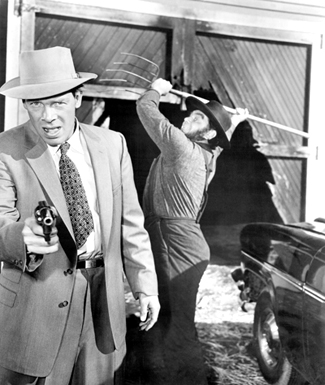FILM-FORWARD.COMReviews of Recent Independent, Foreign, & Documentary Films in Theaters and DVD/Home Video
Directed by Richard Fleischer Written by Sydney Boehm, from the novel by William Heath Produced by Buddy Adler Director of Photography, Charles G. Clarke Edited by Louis Loeffler Music by Hugo Friedhofer A Criterion Pictures release of a Twentieth Century Fox film USA. 91 min. Not Rated With Victor Mature, Richard Egan, Stephen McNally, Lee Marvin, Ernest Borgnine, Virginia Leith, Silvia Sydney, J. Carrol Naish & Tommy Noonan Shot on Technicolor and one of the first Cinemascope films, Violent Saturday is crackling entertainment, a bank heist movie with a pre-Altman ensemble; it’s less and less about plot than about the interactions with the various characters. A war veteran (Victor Mature) is seen as a slight disappointment to his son for not being a true-blue war hero; a meek and awkward clerk at the town bank (Tommy Noonan), infatuated with a local honey, is a peeping Tom late at night; wealthy Boyd (Richard Egan) drinks while his wife flirts at the local country club; and a librarian (Sylvia Sidney) steals to pay her bills. Comparatively, it almost looks as though the criminals coming into town – Stephen McNally, J. Carrol Naish, and the inimitable Lee Marvin – won’t be as interesting as all these small-town folk who run the gamut between rich and lower middle class and have the kind of woes and troubles that range between Leave it to Beaver and a Sirk movie. But have no fear for those who love a good heist (or, for that matter, want the title to live up to its good name, which sounds like a paperback novel drenched in blood). The late director Richard Fleischer, of near-classics like the The Narrow Margin and Armored Car Robbery, not only provides a kick-ass heist as the climax, but there’s a twist - the hideout will be none other than an Amish farm just outside of town, owned by the calm Stadt (a brilliantly one-note Ernest Borgnine with a fake beard holding the occasional scythe). Violent Saturday is packed with the kind of one-liners (“Stick these in your kisser and go suck on ‘em. Now go back to your mother”) that you only find in obscure studio noir. The cinematography’s almost a trick, part of the subversive fun. The film isn’t in the shadows and the fatalistic mood of a black & white Dassin or Lang, but in crisp, bright colors by DP Charles G. Clarke. And the heist almost gets in the way of some unusually meaty and occasionally hammy scenes of human drama and unintentional comedy (like Mature’s scenes with his son, played by a typical “gee golly” kid actor of the period).
Still, even in this mix of pulp and melodrama, there’s time to let the criminals shine, with even a nail biter at the Amish farm towards
the end. I loved scenes like where Marvin, the night before the robbery, wakes up McNally with the jitters over someone possibly watching
them from the outside, and then unloads his neuroses over his ex-wives and more. A bad-ass like Marvin with issues? If he only knew everybody else.
Jack Gattanella
|

